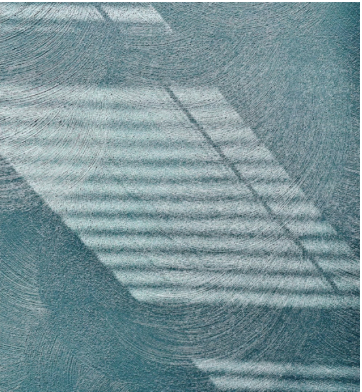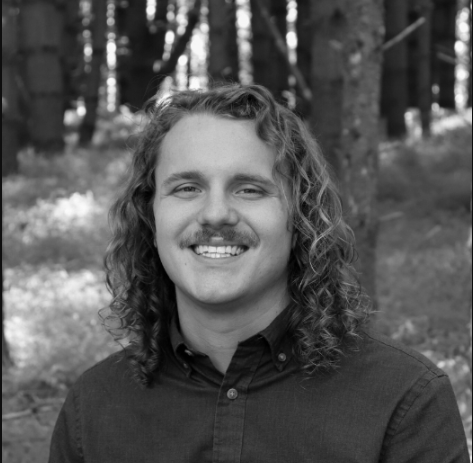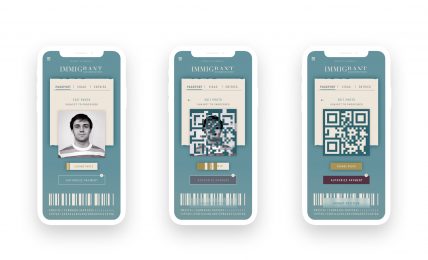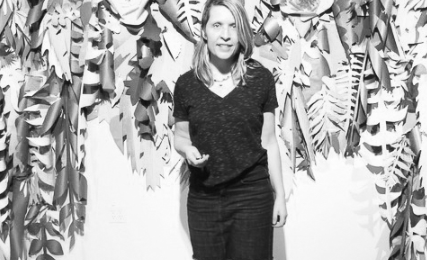Digital America interviewed Denver Nuckolls in November 2023 about their piece, dead account (2023).
:::

Digital America: In dead account you delve into the relationship between technology and humanity with the fusion of keyboard improvisations and digital processes, which ends up creating a captivating narrative. Can you recall a specific moment that inspired you to explore this concept? How did it shape the direction of your work?
Denver Nuckolls: The original catalyst of this project as a whole was a desire to follow my first full-length release, it comes in waves, with a new body of work. I had only points of curiosity at that moment, notes of “to explore” more than a grounding project concept. My interest in how people interact with technology and social media was peaked primarily by a personal need to examine my relationship with these digital spaces; at the time one of disruptive comparison, heavy overuse, and general unhealthiness. While ruminating on whether I should lessen or completely nix my time on social media, I began to see poignancy in the hinge moment of one ceasing to use an online account. I found there are an infinite number of possibilities and nuances that may result in a dead account; was the person ‘cancelled’ or found to be something other than what they portrayed online? Did they have a toxic relationship with technology? Was their account hacked and forcibly removed from them? Did they pass away? As I realized how much of the spectrum of humanity could be contained in this one digital moment, I began exploring my emotional responses to these ideas with keyboard improvisations and setting them within soundscapes created via one of the most arguably important tools to a technological existence: the smartphone. Through this process and a continued investigation into different intersections of the human and digital experiences, dead account slowly revealed itself and began to take shape.

DigA: You’ve said, “dead account is an attempt to come to some sort of terms with the influence of a constant, seemingly inescapable stream of technology on my own and society’s existences.” Having experienced the depth of the EP there were intriguing moments as the piece unfolded as well as self-contemplation. As an artist how do you see your role in not only exploring, but also in raising awareness about technology overtaking our lives?
DN: This is something I think about often, and my perspective on it changes from minute to minute. My primary goal as an artist is to be authentically cathartic, utilizing only experiences I have undergone to inform my work and the process itself as a means to understand my day-to-day life. This project is a prime example, coming about in large part because of my own self-destructive relationship with social media. While the main aim of dead account is to procure in the listener a similar space for examining their own ties to technology, I realize and recognize that technology is simultaneously the reason that this project is able to exist at all. I am not working with the goal of destroying society’s relationships with machines because 1. that’s impossible and 2. technology can be extremely helpful and widely uniting in ways unfathomable 100, 50, or even 25 years ago. dead account may present negative aspects of social media, constant communication, etc., but it doesn’t show the positive strides technology has assisted medicine and science and literature and countless other fields in taking towards the betterment of our lives in this modern day. Because of this, I believe my work’s role is that of offering sonic representations of only what affects me personally with the hope that I am not alone in my experiences and that others may find reflection, solace, growth, or anything else they may need in ways unique to them.
DigA: When thinking about the digital transformation theme in dead account and the possible future of music in this digital age, I see trends that align with other pieces of yours such as ‘3 Days in June’. From my perspective, the exploration of experimental compositions and themes in your portfolio seems to align with the evolving music scenery. How would you perceive these tendencies in shaping the trajectory of your work? Where do you draw inspiration from other musicians in this space?
DN: One of my favorite of the great abstractions of music is that of a ‘sound’; whether a vibe silently agreed upon through a community of other music and musicians, a style identifier relating to what notes one plays when, or the literal creation and presentation of the waves we hear, the idea of a ‘sound’ is something I always look towards for inspiration. This has changed throughout my life and will continue to develop as I experience and learn more. In my past, this has been punk rock, funk, jazz, classical, free music. At the moment, my daily processes revolve around finding a place for the human act of improvisation in a context created and supported otherwise through digital means. As device innovations continue to be made and new digital processes integrate themselves into my practice, the way I create will inevitably morph, and I welcome this change with open arms and ears. In a way, it’s simply an extension on my time with dead account, constantly searching and reorganizing my compositional approaches and developing a ‘sound’ to express my experiences in new ways. On a tangent, one of the most exciting things about the digital influence of the internet in particular on our lives is the unrestrained access to music we would potentially never have without it. During the COVID-19 pandemic, I scoured the internet for new music twice as much as I had previously, listening as much as possible and experiencing entirely new ecosystems of sound from my apartment. One of the more forming moments of this time for me was the discovery of Claire Rousay and Jen Hill’s Alcohol, released on heavy mess in February 2020. I had performed with a few new and experimental music ensembles while in academia, but this music was unlike any I had ever experienced. It was all I listened to for days, trying to parse out sound origins, processing styles, things of that nature. It deeply affected the music I was working on at the time and inspired me to take chances and utilize sounds and processes I never thought I would. From there, I dove deeply into Rousey’s work, which led me to her process of improvisation, ‘lowercase music’, DIY’s influence on the digital world, and other artists embodying similar beliefs, and it shaped a huge part of my current ethos and ‘sound’. Other musicians I owe many thanks to for their sonic and practice-based influences on my work include M. Sage, Jefre Cantu-Ledesma, Zachary McDonald, Marie Carroll, Lia Kohl, and innumerable others. The trajectory of my work has always been and will continue to be a method of translation, finding work that opens me up to and shows me around in worlds I could not imagine.
DigA: You’ve said, “As the EP progresses, the influence of the digital on the analog gradually hardens, eventually overtaking and leading to the last track, in which all recorded sounds are digitally synthesized and processed. This is the moment of greatest poignancy.” When experiencing the last part of the EP I felt a shift in the atmosphere and emotionally it seemed to evoke a sense of tension but also melancholy in myself. How did you intend for the audience to feel during this last part of the EP, and could you share your emotions and thoughts when creating it?
DN: In my experiencing, the mood from track 3 onwards darkens a bit. It seems as though an inevitably sets in, a feeling that what we anticipated is now obvious and unavoidable. As the bitcrushed phone trills of phantom ringing syndrome score the last moments of reflection on what we may have done differently, the narrative closes, slowly tying itself up into the last two pieces. Track 5 shares its title with the project whole, providing a sort of quick punctuation to the conversation between the human and the digital, lighting the final moments of the account while ‘still alive’, so to speak. I composed dead account [the track] and digital comforts somewhat concurrently, thinking that the latter would be a stand-alone release further supporting the subject matter I was approaching with dead account [the project]. However, upon sending the main tracks [1-5] to my long-time friend and collaborator Zachary McDonald for his thoughts, I sent digital comforts on a whim, not saying anything about it besides it being something else I was working on. He suggested it working as a bonus track, and listening to it in the context of the project immediately clicked the narrative arc into place. It created this special ending, providing an epilogue to the human vs. digital relationship that still hints at the classic trope of ‘To Be Continued?’. In the context of the project, it is the first and only track where everything was completely digitally created, providing it a subtle, pseudo-robotic quality that grounds the endgame of the project in a strange, silver corner of the uncanny valley.
DigA: 5. Can you talk to us about what are you working on at the moment?
DN: I try to work on as much as I can at any given time to keep myself thinking and moving forward. In my group efforts, I am working with Boston, MA-based folk-punk group The Croaks on drums, writing and refining new music for our first recording effort in this lineup. An exciting debut project I recorded, mixed, and mastered for Brooklyn, NY funk-pop outfit Aunt Judy will be releasing in early 2024. Another recent recording date included a host of tunes with pianist Lenny Marcus, bassist Zachary McDonald, myself on drums, and engineer Dave McDonald for a 2024 piano trio release and subsequent road performances. My next solo endeavor is also in the finalizing stages. At this moment, it is the first of four anticipated collections comprising a series of albums that approach the human experience from a variety of universalities. This release, I am excited to say, will come in early 2024 on the Cambridge, MA-based record label Idolatrous Recordings. Hoping for another year of good art and experiences, and I wanted to express my sincerest thanks for this opportunity to speak with Digital America. Here’s to you and all those creating in the next year and those to come!
:::
Check out dead account by Denver Nuckolls
:::

Denver Nuckolls is a performer, composer, audio engineer, and educator specializing in a variety of improvised, electronic, and contemporary styles of music. His works have activated spaces in galleries and performance venues across the globe including MG Space (Beijing, China), the Museum of Science (Boston, MA), and the Fostek Hall at the Jefferson Center (Roanoke, VA).



